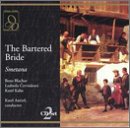| All Artists: Smetana, Blachut, Cervinkova, Kalas, Ancerl Title: Bartered Bride (Czech) Members Wishing: 0 Total Copies: 0 Label: Opera D'oro Release Date: 7/2/2002 Genre: Classical Style: Opera & Classical Vocal Number of Discs: 2 SwapaCD Credits: 2 UPC: 723724387720 |
Search - Smetana, Blachut, Cervinkova :: Bartered Bride (Czech)
CD Details |
CD ReviewsA highly pleasing "Bride" from 1947 L. E. Cantrell | Vancouver, British Columbia Canada | 07/31/2005 (5 out of 5 stars) "Source: Recording made for broadcast on Czech radio, November 1947.
Sound: Pretty good mono. Voices are well-captured. Occasional changes in resonance are noticeable, possibly marking changes in original matrices. Orchestral sounds are nicely represented, although without the spaciousness of a DDD recording. It is clear that the preceding reviewer has a far more acute ear than I do, for I do not find a remarkable decline in sound quality in the latter half of Act III. Documentation: No libretto. Brief summary of the plot. Czech and English titles are given for each track but singers are not identified nor are timings provided. Format: Disk 1 - Overture, Act I (five tracks), Act II (seven tracks). Disk 2 - Act III (eleven tracks). Principal cast members: Jenik - Beno Blachut; Marenka - Ludmila Cervinková; Kecal - Karel Kalas; Va?ek - Rudolph Voná?ek; Esmeralda - Jarmila Pechová. There never has been any such thing as a singer-proof opera, as the rival bargain-priced version of "The Bartered Bride" from the usually reliable Naxos so clearly and so drearily demonstrates. Fortunately, that is not an issue here, for this recording offers a generally admirable cast. Beno Blachut, the lead tenor, sings with a pleasantly creamy tone and extracts about as much warmth as can be found in the self-centered and unfeeling Jenik. (How many other romantic leads, after all, conduct their lives from a saloon, feud with their parents, double-cross their brothers, swindle hard-working small businessmen and heartlessly cause distress to their intended brides?) The character tenor, Rudolph Voná?ek, is even better as the hapless but always appealing brother, Va?ek. I would hazard a guess that this performance was recorded pretty much straight through from beginning to end, for bass-baritone Karel Kalas starts out with a pleasant-sounding but unfocussed sound--something on the order of a good B-list Italian baritone. By the time he gets down to hard-bargaining with Jenik over a couple beers, however, he has warmed up to sing with impressive authority and fine Slavic edge. (Even so, he does not fully plumb the basso profundo depths that lurk in the score.) The women in the cast have the rich, plummy sound (think Zinka Milanov) that seems to arise from Central European vocal training. This is particularly true of Marenka, the Bride herself, Ludmila Cervinková, and only slightly less so of Jarmila Pechová as the carny girl, Esmeralda. In a Western European or North American production, both parts might be assigned to lighter, more girlish voices, but in the context of this opera and this cast, Cervinková and Pechová sound just right to me. The conducting on this set is admirably precise and brisk. Even the big, sentimental ensemble in the third act holds its shape and sense of direction from beginning to end. This is a well-sung, well-conducted opera recorded in adequate sound. It was a pleasure to hear from the first notes of the overture and I fully expect that it will remain as pleasing in all future hearings. Five stars." |

